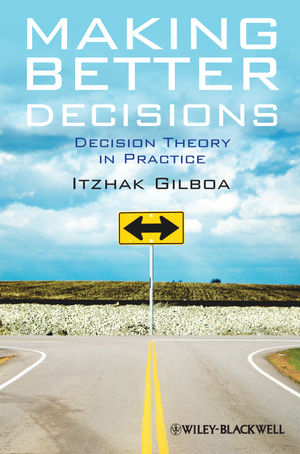Making Better Decisions: Decision Theory in PracticeISBN: 978-1-4443-3651-1
Hardcover
232 pages
October 2010, Wiley-Blackwell
 This is a Print-on-Demand title. It will be printed specifically to fill your order. Please allow an additional 10-15 days delivery time. The book is not returnable.
|
||||||
—Marzena J. Rostek, University of Wisconsin
“Written by a leading authority and teacher in the area of
decision theory, this is a terrific combined
textbook–handbook for students and practitioners of
management. Indeed, it is a terrific book for everyone interested
in ‘making better decisions.’"
—Adam Brandenburger, New York University
“This book is extremely effective for anyone who wants to
acquire quick, basic understanding of old and new concepts of
decision theory, with a minimum level of technical
details.”
—Ehud Kalai, Northwestern University
"Gilboa is one of the leaders of the revolution that has swept
through the field of decision theory in the past few decades, in
which mathematical methods of statistics and economics have been
integrated with findings from modern psychology. In this book he
provides an accessible and practical survey of the state of the
art, which encourages readers to reflect on – and try to
sharpen – their intuitions and habits of decision
making. It would make an excellent primary or supplementary
text for an undergraduate- or masters-level course in decision
theory. It should also be useful and enjoyable reading for anyone
who wants to learn about concepts that can be used and mistakes
that should be avoided when taking calculated risks."
—Robert Nau, Duke University
"Itzhak Gilboa is one of the deepest thinkers in modern decision
theory. In this fascinating and wonderfully written book he uses
the fundamental models of decision making as a basis for reflection
upon several systematic patterns revealed by our everyday choices.
He strikes a nice balance between analytical models, psychological
insights, and pragmatism with the end goals of improving our
decision making and better understanding the decisions of
others."
—Tomasz Strzalecki, Harvard University



